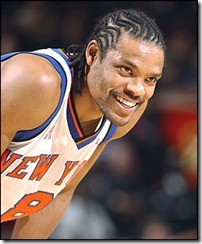Mitchell James Richmond (born June 30, 1965 at Fort Lauderdale, Florida)
Mitch Richmond was drafted by the Golden State Warriors at number 5 overall in 1988 NBA Draft. His first season (1988-89) as an NBA player Richmond averaged 22ppg., 5.9rpg., 4.2apg. and was selected as the NBA’s Rookie of the Year. His special scoring ability alongside Chris Mullin’s (26.5ppg. in 1988-89) made the Warriors a play-offs team immediately. He was a perfect fit for Don Nelson’s offense that involved a lot of fast breaks and quick shooting. That year, the last season of the 80s, Warriors made it to the Western Conference Semi-finals, where they lost 4-1 to the Phoenix Suns.
Unfortunately, Western Conference Semi-finals would be the furthest Richmond would reach into the play-offs throughout the 90s (Warrios 90-91)and this is something that definitely hurt him personally as well as his reputation. I believe that even in the ranking of this blog he would have been higher if he had achieved more things on a team-level. However, individually Richmond was definitely one of the finest stars the 90s had to offer and probably one of the most underrated players ever. Personally, I have underestimated him as a player, when he was active, and only felt his presence when he won the MVP award at the 1995 All-Star Game.
Richmond will always be remembered as a member of the trio of the run n’ gun offense Don Nelson employed at the Warriors’ team during 1990-1991, aka Run TMC. The trio was composed of Tim Hardaway, Mitch Richmond and Chris Mullin and made to the Western Conference Semi-finals in 1991. All three members of the Run TMC averaged over 20 points per game in 1990-91; Tim 22.9, Mitch 23.9 and Chris 25.7. This team despite the fact that it didn’t accomplish anything big, will always be remembered by those witnessed it as it played an up-tempo, high scoring and spectacular game.
The Run-TMC era lasted only two years as the 1991-92 season found Mitch Richmond in Sacramento; traded for Billy Owens. This was something like the beginning of a nightmare for him. This is how he described his years at Sacramento:
“I was trying to get out of there every year—I tell you the truth. I tried to play a mental game with myself. Don’t even look at the score. Try to go out every night and just play hard and don’t worry about the score. Just get the respect of your peers.” (SLAM)
I remember watching him striving every year, to achieve team goals all by himself. I always thought that David Robinson did not have the necessary help to win a championship but looking back now, I think Richmond was in the worst position comparing with the other superstars of the 90s. I wish the Spurs had traded for him and paired him with Robinson…imagine that. I think a Richmond-Robinson duo probably in 1994 would have changed the NBA-history of the 90s. Unfortunately this is something I can only dream of.
The more I think about it the more I am convinced that the best characterization for Richmond is that of a superstar an unlucky superstar; if MJ identifies you as the toughest opponent he had faced then I think you must be at the superstar level. Their duels were a special treatment for us NBA fans of the 90s (whenever they were televised and broadcasted in Greece…) What made Richmond so special is that he had very few weaknesses in his game, he was a great shooter and he was really strong and competent in both ends of the floor.
He only made it once to the play-offs, with the Kings, in 1996 as the 8th team of the West and played against the powerful Seattle Supersonics that defeated them 3-1 and advanced all the way to the NBA Finals to lose 4-2 to the Chicago Bulls. Statistically his best season was the one that followed; in 1996-97 he averaged a career high 25.9ppg. (5th overall). During the summer of 1996 he was also selected as a member of what it was known as Dream Team III and won the Gold Medal at Atlanta’s Olympic Games. Even in this case there were many that thought of him as an unexpected selection – just for the record, I did not belong to that group of people.
Richmond, or ‘the Rock’, as his nickname was, participated in 6 consecutive all-star games during the 90s (from 1993 to 1998), but he was a starter only in 1994. He was also selected three times in the all-NBA second team (1994,1995,1997) and two times in the all-NBA third team (1996, 1998). He finally left Sacramento at the end of 1997-98 season as he got traded to Washington for Chris Webber. His fate, however, unlike that of the Kings, did not change after the trade. During the last season of the 90s he averaged below 20ppg. (19.7) for the first time in his NBA career. Richmond was basically at the end of his career when he got traded to the Wizards and he was lucky enough to win a championship in his last year as a member of the Lakers (2001-02), even though not in the fashion he would wanted it to be (he was a bench warmer in that Lakers team).
| Points | Rebounds | Assists | Steals | Blocks | |
| Career | 21.0 | 3.9 | 3.5 | 1.2 | 0.3 |
| 1996-97 | 25.9 | 3.9 | 4.2 | 1.5 | 0.3 |
| 1990-1999 | 23.0 | 4.0 | 3.8 | 1.3 | 0.3 |
http://www.basketball-reference.com/players/r/richmmi01.html



